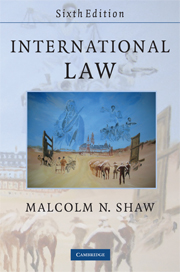Book contents
- Frontmatter
- Contents
- Preface
- Table of cases
- Table of treaties and selected other international instruments
- List of abbreviations
- 1 The nature and development of international law
- 2 International law today
- 3 Sources
- 4 International law and municipal law
- 5 The subjects of international law
- 6 The international protection of human rights
- 7 The regional protection of human rights
- 8 Individual criminal responsibility in international law
- 9 Recognition
- 10 Territory
- 11 The law of the sea
- 12 Jurisdiction
- 13 Immunities from jurisdiction
- 14 State responsibility
- 15 International environmental law
- 16 The law of treaties
- 17 State succession
- 18 The settlement of disputes by peaceful means
- 19 The International Court of Justice
- 20 International law and the use of force by states
- 21 International humanitarian law
- 22 The United Nations
- 23 International institutions
- Some useful international law websites
- Index
4 - International law and municipal law
Published online by Cambridge University Press: 05 June 2012
- Frontmatter
- Contents
- Preface
- Table of cases
- Table of treaties and selected other international instruments
- List of abbreviations
- 1 The nature and development of international law
- 2 International law today
- 3 Sources
- 4 International law and municipal law
- 5 The subjects of international law
- 6 The international protection of human rights
- 7 The regional protection of human rights
- 8 Individual criminal responsibility in international law
- 9 Recognition
- 10 Territory
- 11 The law of the sea
- 12 Jurisdiction
- 13 Immunities from jurisdiction
- 14 State responsibility
- 15 International environmental law
- 16 The law of treaties
- 17 State succession
- 18 The settlement of disputes by peaceful means
- 19 The International Court of Justice
- 20 International law and the use of force by states
- 21 International humanitarian law
- 22 The United Nations
- 23 International institutions
- Some useful international law websites
- Index
Summary
The role of the state in the modern world is a complex one. According to legal theory, each state is sovereign and equal. In reality, with the phenomenal growth in communications and consciousness, and with the constant reminder of global rivalries, not even the most powerful of states can be entirely sovereign. Interdependence and the close-knit character of contemporary international commercial and political society ensures that virtually any action of a state could well have profound repercussions upon the system as a whole and the decisions under consideration by other states. This has led to an increasing interpenetration of international law and domestic law across a number of fields, such as human rights, environmental and international investment law, where at the least the same topic is subject to regulation at both the domestic and the international level (and indeed the regional level in the case of the European Union). With the rise and extension of international law, questions begin to arise paralleling the role played by the state within the international system and concerned with the relationship between the internal legal order of a particular country and the rules and principles governing the international community as a whole. Municipal law governs the domestic aspects of government and deals with issues between individuals, and between individuals and the administrative apparatus, while international law focuses primarily upon the relations between states.
- Type
- Chapter
- Information
- International Law , pp. 129 - 194Publisher: Cambridge University PressPrint publication year: 2008



